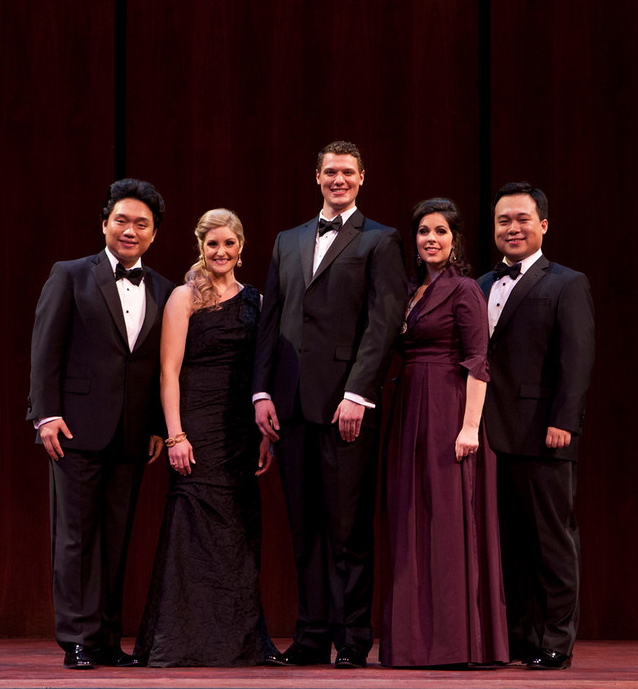Met Council winners shine and rise at finals concert

The winners of the 2014 Metropolitan Opera National Council Auditions. From L-R: tenor Yi Li, soprano Julie Adams, bass Patrick Guetti, soprano Amanda Woodbury, and bass-baritone Ao Li. Photo: Rebecca Fay/Metropolitan Opera
The Metropolitan Opera National Council’s annual Grand Finals auditions concert is a chance for opera fans to take the art’s temperature, and to get an idea where it might be headed. Sometimes, it provides a sneak peek at a future star or two. 130 singers on this season’s Met roster got an early boost from their participation in the Auditions, including Stephanie Blythe, Renée Fleming, Susan Graham, Deborah Voigt, Thomas Hampson, and Patricia Racette. 2007, the year the concert was covered in the documentary The Audition, gave us Angela Meade, Alek Shrader, Michael Fabiano, and Jamie Barton.
The Grand Finals concert on Sunday showed a generally high level of competence among its nine contestants, though, on the whole, the potential for star wattage among these singers may still take some time to develop. And a big question hung over the entire concert: Why was there not a single mezzo among the contestants? Surely there must have been one out of the 1,500 entrants who could have made the cut.
Each singer was allotted two arias, one in each half of the afternoon’s concert. Countertenor Christopher Lowrey opened with “Furibondo spira il vento” from Handel’s Partenope, which he sang with pointed tone and an engaging physicality. He also flirted briefly with a surprisingly strong chest register. During the second half, he showed a flair for clean diction, declamation, and dynamic control in Handel’s “Dove sei, amato bene?” from Rodelinda.
Tenor Rexford Tester, who had an ingratiating presence, showed easy authority and penetrating, push-button high notes in “Languir per una bella” from Rossini’s L’Italiana in Algeri. He handled both the long, mezza-voce lines and the rapid runs with equal ease. In the second half, he made the dubious choice of singing “Here I Stand” from Stravinsky’s The Rake’s Progress. The aria does not work well out of context, and Tester could not really make much of an impression with it. His English diction was indistinct, though this was not helped by Stravinsky’s unforgiving English-as-a-second-language setting of Auden’s libretto.
Soprano Amanda Woodbury sang “Non mi dir” from Mozart’s Don Giovanni with lovely, elegant tone and quicksilver fioriture. She also delivered a deeply felt Mad Scene from Thomas’s Hamlet, replete with good French, a gorgeous upper register, dead-on high notes, and a perfect trill. Bass Patrick Guetti, though tall and handsome, appeared a bit physically awkward onstage. His striking, granitic bass carried the day, however, and he sang “Il lacerato spirito” from Verdi’s Simon Boccanegra stylishly, down to the sepulchral low notes. He appeared decidedly more relaxed in Rossini’s “La Calumnia” from Il Barbiere di Siviglia, during which he used his long limbs and long hands to fine comic effect.
Tenor Rafael Moras lent a sweet demeanor and fine technique to “Una furtiva lagrima” from Donizetti’s L’Elisir d’amore without quite putting a memorable personal stamp on it. He made a much stronger impression with “Ah, lève-toi, soleil!” from Gounod’s Roméo et Juliette, which he delivered with full-voiced ardency and clear diction. Soprano Nicole Haslett, looking lovely and completely at ease onstage, wove a spell with her sweet timbre and finely spun pianissimi in “Sul fil d’un soffio” from Verdi’s Falstaff. During the second half, she attempted Zerbinetta’s aria from Strauss’s Ariadne auf Naxos, which revealed some flaws, including pressured high notes as well as trills that were not cleanly delineated. Her charm and gorgeous timbre helped compensate for the rough spots.
Tenor Yi Li, from Jinan, China, displayed a honeyed tone and a good deal of passion in “De’ miei bollenti spiriti” from Verdi’s La Traviata, as well as more vocal weight than we often hear from other Alfredos. He wielded equal ardency, and well-enunciated French, in “Pourquoi me réveiller” from Massenet’s Werther—daunting, as Li was following in the footsteps of Jonas Kaufmann on the same stage only two weeks before.
Soprano Julie Adams sang “L’année en vain chasse l’année” from Debussy’s L’Enfant prodigue; not much of the text came through, but she delivered a very dramatic performance and was able to swell her sound from a lovely pianissimo a large, forceful cry. The problem of muddy diction persisted in her “Donde lieta uscì” from Puccini’s La Bohème, though she built the aria nicely and did a lovely descrescendo on the penultimate phrase.
Bass-baritone Ao Li from Denzhou, China overplayed his Catalog Aria from Mozart’s Don Giovanni, Mickey-Mousing it every step of the way. The audience ate it up. He was more restrained in the Cavatina from Rachmaninoff’s Aleko, though he interpolated some unnecessary silent-movie semaphore at the end of the aria. In both of his selections, his sound, to these ears, was serviceable rather than striking.
National Council Auditions winner Lawrence Brownlee was the afternoon’s genial host. Marco Armiliato provided sensitive conductorial support to these young singers, who were lucky enough to get to perform—perhaps for the only time in their careers—with one of opera’s greatest orchestras. Susanna Phillips, also a Council Auditions winner, entertained the audience with a smooth rendition of “Dove Sono” from Le Nozze di Figaro while the judges tallied the votes.
The five winners, in alphabetical order, were: Julie Adams, Patrick Guetti, Ao Li, Yu Li, and Amanda Woodbury. But don’t write the others off. We are likely to hear more from them as time goes by.



Posted Mar 31, 2014 at 6:57 pm by Jane Unger
There was one mezzo in the semi-finals – Sofia Selowsky – referenced by Brian Dickie in his March 23 on-line posting.
Posted Apr 01, 2014 at 12:33 pm by CastaDiva
‘…these young singers, who were lucky enough to get to perform—perhaps for the only time in their careers—with one of opera’s greatest orchestras. ‘
So is Mr Myers already writing them off as incapable of performing again at the Met?